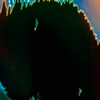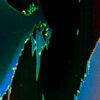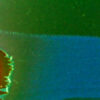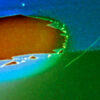On the map, neat little huts are scattered over the two great ranges on each side of the Mesta River – the Rila and the Rhodope. Each hut has a family name attached to it: Pironkovi kolibi, Mangovi kolibi, Panovi kolibi, Leshovi kolibi, Evrovi kolibi, Manovi kolibi, hundreds of kolibi. Koliba is a mountain house for shepherds and other forest dwellers, and the word is used in Greek, Bulgarian and other Slavic languages. It probably goes back to antiquity, just like the way of life it stands for. Near the kolibi are marked-up mandras, or dairy stations, which are also all named. Every settlement, gully, cliff, peak and glade in these highlands is sentient, named after individuals, or ethnic groups like the Turkic pastoralist tribe the Yuruks: Yuruk Peak, Yurukovo. Sometimes they’re named after animals too, or plants, trades, or even emotions evoked by long-ago events: Bulls’ Huts, the Horses, Nuna’s Grave, Birch, Oak Glade, the Fort, Moussa’s Ridge, Kara (Black) Mandra, Avramovo, the Oldie, Raichevi Fields, the Water Roller, Cobbler, Potter’s Peak, Evil Shadow. Some place names are mysterious, lost like the people who’d have known what they meant: Léevé, Fanos, Nehtenitsa, Ropalitsa. Some of the names in this part of the Rila–Rhodope massif are probably remnants of Thracian, a language now lost. We know that the oldest traceable inhabitants of the massif were the Bessi, a Thracian tribe famed for their resistance to Roman colonisation and for their priestly caste, which contributed to the rise of the philosophical movement of Orphism.
Every square centimetre of this long-inhabited massif is encoded with story, even on the map. This cartographic business absorbed me, and I imagined that the place names still served their purpose, that these highlands bristled with multi-generational communities of cows and sheep, goats and humans, horses and watering stations, cobblers’ workshops and storytellers by the fire.
But the mountain was silent at dusk, silent in the dawn that breaks golden over blue-green folds, doubly silent – once with remoteness and twice with abandonment.
I first came here with Erol, only days after arriving in the nearby riverine town of Yakoruda in southern Bulgaria. The Mesta River is smack in the heart of the southern Balkans, equidistant from the Adriatic Sea to the west and the Black Sea to the east, and running into the Aegean Sea to the south. I was still hill-shocked by the forbidding topography along which I had travelled. The two mountains squeeze the river like a birth canal. You travel along the geological fault out of sheer fright and faith, seeing neither the end nor the beginning.
The river itself starts its 230-kilometre journey just south of the Balkans’ highest and coldest place – Rila’s Musala Peak (2,925 metres). By the time you reach the top, you understand its name: you are mus-Allah, ‘near God’ in Arabic.
Many minor tributaries birth the river, but I came to be near the two major ones, named with poetic symmetry White Mesta and Black Mesta. Locals say that the names are inspired by the white stones in one and the black stones in the other. Erol hadn’t been to the source of either, because the further you climb upstream, the less hospitable the ground, the darker the glades, the more frequent the bears and the more sudden the accidents.
‘White Mesta originates in Djéenem Déré,’ Erol said. ‘Which says it all.’ Djéenem Déré means Hell’s Gully in Turkish.
Yakoruda, Erol’s birthplace, is a handsome mountain town with a famed weekend market, a mosque and a church whose bells once sang with human voices. Yakoruda means literally the Great Ore; the mountains to the south had been mined since antiquity. In the 1950s geologists found intact tools inside the sealed tunnels and, astonishingly, woven baskets and wooden ladders from before the Roman colonisation, preserved thanks to the lack of oxygen. Yakoruda straddles the massif, with the Rila to the north and the Rhodope to the south. To get to the town from the riverside road, you crossed one of several bridges. In the reinforced basin, the shallow river glinted at sunset, strewn with rubbish. It was hard to imagine that in the last big flood, the tributaries had merged and swept away roads and houses. But the following winter, during heavy rainfall, I saw the river unfurl like a dragon from its sleep and wipe out bridges.
Yakoruda and the entire Mesta basin is home to a diverse Pomak population, whose syncretic culture preserves centuries of social, spiritual, geographic and ethnographic meaning. Some of the women still wore distinctive, bright shalwar trousers, floral headscarves and hand-knitted cardigans and tunics, while the old men were distinguished by a small knitted skullcap or a beanie.
Erol’s family owned a grocer’s shop, but his passion was landscape photography. He was a slight man in a down-stuffed jacket, dressed as if suffering from a chronic chill. But the summer evenings were, in fact, like winter. Erol grew up in the shadow of a totalitarian regime, a second-class citizen stripped of human rights, living under a forcibly changed name. This is how the entire Muslim community – both ethnic Turks and the Bulgarian Muslims, known as Pomaks – lived for nearly thirty years (1964–1990).
Erol wanted to show me his favourite area, where he’d come to regain his sanity ever since he was a child. He’d been eleven at the time. They were a prominent Yakoruda family. His parents had refused to have their names changed, and his father was hiding in the hills with others when the army arrived and kicked the door in. A soldier hung a rifle on Erol’s shoulder and held him at gunpoint as a shield: ‘Boy,’ he said, ‘let’s see if we can find your father.’ They forced him to open cupboards, so that if the father was armed, he would kill his own son first. After that, Erol lost his speech. He couldn’t speak for a year. It was only after they took him to a traditional healer who performed a bullet-melting ritual with water to ‘lift his fright’ that he began to recover. And that’s when he started coming to ‘The Eye’.
The Manure
The place Erol wanted to show me was an area called Guvnishta, roughly meaning ‘the Manure’ – a name that summed up the history of this place, which had been home to animals for generations. The road we took climbed through a series of meadows and glades, rising and descending like an alpine melody between a switchback road and White Mesta, continuing up to an altitude of 2,000 metres, where it stopped near Nehtenitsa, the southern gateway to the Rila National Park. The Manure was halfway up, at a height of 1,200 metres, and to reach it we abandoned the car and climbed over a wooded mound called Raina Mogila. Mogilas, or mounds, are another recurring feature of this landscape. Many of these mounds, also called by human names, are believed to have tombs or other ancient or medieval remains underneath.
‘As children we came to look for buried gold,’ Erol said. ‘Now the treasure hunters do it.’
Small holes and piles of earth, as if dug by moles, spoke of recent visits from prospectors looking for signs of buried relics. They were one of several destructive forces in the region. Another was the endemic corruption, which had led to a chronic neglect of cultural heritage, laying it open to chancers who were quick to sell any treasure they found to wealthy behind-the-scenes buyers.
‘I’m glad we found nothing as kids. That way, I can still believe.’
Where there is ruin, there is hope for a treasure, wrote the Persian poet Rumi in the thirteenth century.
We passed through a forest path like an arboreal tunnel. This is what Erol called ‘The Eye’ because at certain times of day – like now, before dusk – you seemed to be staring into a giant green iris with a light-tunnel for a pupil.
A large woolly dog came over, wagging. Her left ear was severed. Behind her came a mare with a skinny man astride, wearing a beanie. His sun-leathered face bore the startled expression of one who hasn’t seen visitors for a long time. The two recognised each other as fellow Yakorudans, and he invited us for a coffee at their koliba.
This is when I saw them in the flesh: the houses with human names. Some had terraces and porches. Crumbling houses in stone, earth and wood, the size of a large two-storey country cottage, but here the ground floor had been for animals. They were now engulfed by greenery. The novice eye could take in the lie of the land and, distracted by its lushness, miss them altogether.
‘In my childhood, it was still busy up here,’ Erol said. ‘These were cultivated fields.’ His grandparents had owned pasture land, now abandoned.
We climbed to the koliba with the smoking chimney. The skinny man’s son and mother sat on tree stumps and drank coffee. They all had sharp, eagle-like features. The son’s wife was here too, shouting at the sheep while Mehmed, the father, closed the outdoor pen. Four dogs, all with a severed ear, rose to greet us or stop us.
‘They’re mean,’ said the son. His name was Emin. ‘They attacked our colt. ’Cause they didn’t recognise it as the pack.’
Woolly puppies with intelligent eyes huddled under a Russian UAZ (classic armoured off-road vehicles). Their ears were severed. The females had their left ear cut, the males the right.
‘The younger it’s done, the better,’ Mehmed said. ‘So they forget.’
This was tradition – to make the dogs meaner, he explained, and give them better hearing. I’d been told this before and the rationale struck me with its irrationality, on top of its brutality.
‘’Cause they come face to face with wolves and thieves,’ the explainer always added. The puppies looked traumatised under the car. This practice was still widespread. Animal rights counted for little in these remote parts where, within my lifetime, human rights too had suffered multiple and devastating blows.
These dogs were all Karakachanki, a highly prized pedigree breed native to Bulgaria and used throughout the southern Balkans. They are legendary herding dogs of phenomenal intelligence, strength, loyalty and independence.
‘How would you feel if someone cut off your ear?’ I couldn’t help myself. Mehmed smiled and shrugged it off.
‘Anyway,’ he said through his few remaining teeth, though he was only fifty-two. ‘Their ears are ugly.’
Seeing the mutilated puppies made me want to turn away from these people. This is what I would have done, but for the pandemic. I had been planning to travel along the length of the Mesta river, but the geography of my journey had been compressed by the closure of the Bulgarian–Greek border. I spent longer in fewer places. Breadth became depth. I climbed mountains, talked to people without taking notes, slept in afternoon meadows and got bitten by poisonous spiders I didn’t know existed.
‘What’s it like, this way of life?’ I asked the small family.
‘This way of life is over,’ said Emin, a fag hanging from his lip. He was twenty-eight, skinny like his father but more intense, his forehead lined. ‘Look at these weeds. We’re the last ones.’
His grandmother Badé, a stony-faced woman of tiny stature, said nothing, but smiled impishly. Mehmed rolled up a fag, glad of the company. There was a gruffness about the Osmanovi family, a remoteness, and underneath it – something else that felt buried like a secret inheritance. I asked to come and spend a day with them, surprising them and myself. I’d never had an interest in pastoralism. In the Scottish Highlands, where I live, it is a vanished way of life. Farming is a pedestrian, mechanised, lowland business; sheep graze all year round, cows are behind fences, free-range is about as wild as it gets, and the only land-trace of pastoralism is in the forgotten drove roads.
Erol and I passed through ‘The Eye’ again, this time closed because the forest was ready for sleep, and he said:
‘There was a tragedy in this family, from the time of the changing of the names. I don’t know the details, but Emin is named after his grandfather.’
The Karakachanka that had greeted us saw us off to the car, and watched us from Raina’s Mound as we drove downhill to the lights of Yakoruda.
‘She too is lonely,’ said Erol of the bitch, or perhaps the river. I wasn’t sure whether the ‘too’ referred to himself or the shepherd family, or me, or some universal condition. Here, in the alpine light where the outlines of things were all that remained and all that was needed of an evening, the land embodied his words.
At seven in the morning, Emin picked me up in town in his UAZ, which he’d bought after he ditched his German jeep, because ‘the Western ones conk out’.
The back roads were dug out by a summer of rain, ‘the likes of which I don’t recall’, Emin said. Summers here were normally dry.
Emin had a degree in ecology, and his wife a degree in law. They met at university. But there were no jobs for them in Yakoruda. When he asked for a post in the ecology section of the local authority, the mayor was upfront: you don’t vote for me, you’re not a member of my party, there’s no job for you. Extreme party politics were a symptom of endemic nationwide corruption and had emptied towns and villages of their able-bodied men and women. Emin and his wife were ‘a mixed marriage’: he from the Pomak community of Bulgarian-speaking Muslims, and she a Christian from another town.
‘The other option was to bugger off abroad. But we want to live here.’
So he cut his losses and invested in fifteen sheep. Then he bought more.
‘Dad joined me. And Grandma grew up here, so she was happy.’
They had 130 now. The family had always had animals, but even so, it was a bold move to try and survive on small-scale organic farming. All the more given that Emin had previously had a well-paid job as the right-hand man to a wealthy local entrepreneur. Bitter to see Emin quit, his employer had sent him off with, ‘You’re gonna fail with your pathetic sheep.’ Emin’s wife worked as an administrator in a Greek-owned sewing factory that made upmarket lingerie for France. Sometimes she came up to help with the sheep. Sewing workshops, often Greek-owned, began to mushroom in the small towns of southern Bulgaria in the late 1990s, making use of captive labour. In these anonymous buildings, women who didn’t want to emigrate earned £300 in a good month making clothes for Hugo Boss, ASOS and other well-known labels. In summer, seamstresses decamped en masse to pick fruit in western Europe. This became a Covid-spreading corridor throughout 2020, when seasonal workers returned home in infected groups.
The three-generational family made a living from the sheep. But there was milk only in the warmer months, not in winter when the flock was kept in a lower pen near the town, where they liked to munch on fir branches brought to them in bunches. Ten litres of milk made five kilos of cheese. A kilo sold for ten lev or £4.50. At the height of the season, Emin got forty litres of milk a day. That was 200 lev or £90.
‘Come, there’s breakfast,’ said Badé Osmanova. The Karakachanki wagged with recognition. ‘Keep away from them all the same,’ said Emin.
I took off my shoes and crossed the threshold of the koliba. It felt different from last night. I was now an invited guest of the heirs of three old Rila highland clans: Osmanovi, Tsarankovi, Pironkovi. Their names were on the map. Their names were the map.
‘The Osmanovi married within for a while,’ Emin said with a smile. ‘To keep the fortune in the family. But nobody knows where that fortune went!’
And now I was inside, eating Badé’s fluffy doughnuts with home-pasteurised sheep’s cheese by the red-hot iron stove. Two rooms of the house were still in use. They were cosy, whitewashed, with beds and rugs, a humble home that stayed warm in winter and cool in summer because of the thick walls.
The day was structured. First, Emin milked the sheep and the few goats into a bucket. One by one, Mehmed guided them through the milking pen. It took about an hour. Emin said he used to get carpal tunnel pain from the repetitive motion, but no longer. It was not a time for conversation, for the animals brought a raw energy when they were herded into his arms and between his knees. I began to distinguish facial expressions and breeds.
‘This one’s Pramenka, a Romanian breed.’ It was curly furred, with horns.
‘This one is Assaf, from Israel. A cross between Awassi and East Friesian.’
Words that brought in the Fertile Crescent.
‘This one is Marishka.’
A breed from the Maritsa River. Maritsa, also know as Evros and Meriç, is one of three major rivers that spring from Musala Peak, and it crosses Bulgaria, Greece and Turkey.
‘Alinka, come on, darling,’ he said to another. His favourites had names.
‘Come on, you piece of shit,’ to one which resisted. ‘This one’s stubborn. I sweat to get any milk out of her.’
It was true. The sheep had an expression of resistance: I refuse to be a milking machine!
Emin was on the lookout for different breeds. He’d wanted to buy a few dozen highly prized Sharplaninska Pramenka from the highlands of North Macedonia, but because of EU restrictions he couldn’t get them across the border.
The few remaining lambs were kept to one side, and the milking was done once they had fed to their heart’s content. A few of the mothers didn’t have enough milk left, and he let them through unmolested.
‘This one is a Vakla [Black] Marishka breed.’ He struggled with the last one, which resisted too. ‘A bad apple.’
There were five litres in the bucket that morning. It was late summer, and there’d be no evening milking. Badé and Emin sieved the milk through a cloth into a bucket and a sterilised plastic tub. Everything was washed and reused. They couldn’t afford waste. The milk was taken straight away to the mandra in town and sold. Up here, there was no electricity and no storage facilities.
Next, Emin and Mehmed took the sheep out to pasture, wanting to get the best hours of the day before the afternoon heat.
‘You and I can go for a wander,’ said Badé and put on her wellies. ‘I’ll show you my school and some tasty water. Do you have shoes?’
In the highlands, you don’t wear sandals because of the thorns and snakes. Shorts and sandals are for tourists and children. When Emin rolled up his tracksuit I saw how white his leg was, compared to his dark face and arms, like a man of different parts.
Badé
‘Here, I saw the adder here.’ Badé struck the path with her stick. ‘I crushed its head.’
She told me of other reptilian encounters – all her life snakes and lizards had crossed her path, she said, and there had been many freak accidents, like when she stepped on a razor blade as a child and the wound became septic. Up here there was no medical help, so her parents treated the cut with folk remedies – cobwebs, mulched-tobacco poultices and the inside of raw sheep hides, used by shepherds as a blood-stauncher.
Badé found a stick for me too. This was part of the ritual: you go into the hills, and if you don’t bring a stick, you look for one on the ground. This has practical and symbolic use. It is the staff of the nomad, the wanderer, the witch of the forest. You use it for fruit felling, river crossings, pointing at things and self-defence.
‘I’ve never trusted doctors,’ she said, and rolled up her baggy trousers under the floral dress to reveal a badly swollen knee. ‘I put vinegar compresses on it and make do.’
She was in pain. ‘But if I stop walking, I’ll fall down and die.’
So we pressed on. Her pace was fast.
For an hour or two, we scaled a series of alpine meadows, stopping here and there to pick red oregano, juniper berries on prickly bushes, something that looked like the valuable wild cumin of the Rhodope but couldn’t be, because this was Rila, and a camomile-like yellow flower called tansy. ‘Once, we picked it for the wholesale herbalists,’ she said, ‘but it’s been forgotten.’
‘It wards off dragons,’ she added casually, and we moved on, our pockets stuffed with herbs. The tansy is one of those medicinal herbs that has fallen out of favour, despite its broad-spectrum properties.
We left behind the mixed conifer forest and entered the realm of the dwarf mountain pine, found in Rila above 2,000 metres. In some places it has become invasive, like the broom of Scotland, because of soil erosion, forest felling and other climatic changes brought on by human activity in the past seventy years. Until the Communist state began to exploit nature in the late 1940s, Rila–Rhodope had been completely pristine. The massif retains its pre-industrial status today, but there are big environmental threats from quarries and logging. The air thinned as we climbed, leaning on our sticks. We followed some fox prints and saw wolf excrement. Wolves are a pest to shepherds, and always have been – they attack the pen in packs, especially at night or in fog – that’s why you can’t have ‘weak dogs’. Her old Karakachanka was so good, she guarded 300 sheep. She spoke about that dog without emotion, the way she spoke about herself.
‘This was all fields,’ Badé said. ‘Oats, tatties, rye. Wheat doesn’t grow here. And look at it now. Look at this forest.’
Rewilding is often seen as a positive thing, but for Badé the triumph of nature over culture was a loss so deep she had no words for it.
We arrived at a high plateau scattered with semi-abandoned houses; each had once been home to two families. Some were still used in summer by relatives who sowed oats and potatoes, and harvested their fruit trees for preserves. She hit a plum tree with her stick and we ate the blue plums from the ground.
‘Plums are my favourite,’ she said. In summer, she made plum leathers on wooden boards to chew on in winter. A few weeks ago, a massive hailstorm had caught her here, while she was out with the sheep. ‘You could scream with terror, but who would hear you?
We hid under the plum tree.’
‘The sheep love plums. They don’t go for thyme or oregano. They’re like me – they graze what I graze.’
A gravestone above a house marked the resting place of the family member who had found a pile of gold coins in the river – part of the now-lost family fortune.
‘But I bet there’s still a string of coins somewhere,’ she grinned.
We stopped at a drinking spout attached to an old bathtub. How did they bring a bathtub here in the first place? On horseback.
‘Have a drink,’ she said. The water was cold and bodiless. The springs of Rila were legion. Rhodope was drier.
‘I need water from nine springs,’ Badé said. ‘I’ve got six, three more to go.’
The number nine recurs in Bulgarian folk tales, songs and spells. You cross nine mountains to reach the tenth. ‘What’s the water for?’ I asked.
‘For fright,’ she said, and marched on in her wellies, not one to dwell on things.


Sign in to Granta.com.








